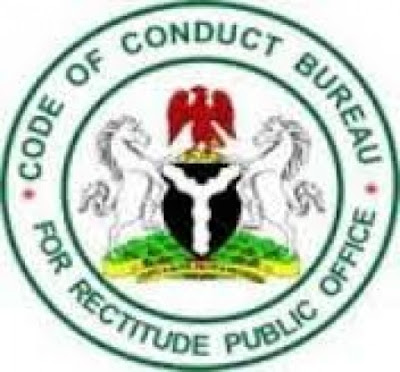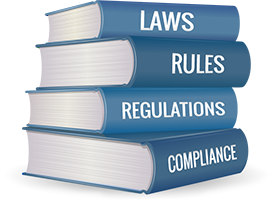Often times, ‘Governance’
refers to the action and manner of governing. Corporate governance is the
mechanism and process which companies and corporations are governed. It is
primarily concerned with balancing the interest of stakeholders- which includes
government, financiers, shareholders, management and the community at
large.
Corporate Governance can
also be said to be the examination of the control of a company as exercised by
its directors. The directors of companies are accountable for their actions to
the company’s shareholders and other members of the company. However, in
practice, the power of the shareholders to affect the behaviour of the
directors is limited and rarely exercised.
The issues of corporate
governance have continually attracted considerable national and international
attention. The current global financial meltdowns have necessitated the need
for a critical focus on corporate governance.
On the other hand,
Regulatory Compliance is an organization’s adherence to laws, guidelines
and regulation and specifications relevant to its business. However, violations
of regulatory compliance regulations often result in sanctions which may also
include fines. These sanctions are always imposed by regulatory bodies in
accordance to statutes.
Corporate Governance is an
increasingly significant aspect of business and organizational management,
extending to international politics and trade laws; and to globalized
economics, corporations and organizations, and markets. In Nigeria, the laws
that saddle each organization with the responsibility of corporate governance
are the Companies and Allied Matters Act 2004, Investment and
Securities Act 2007, Securities and Exchange Commission 2011.
The major elements of
corporate governance are good board practices, control environment, transparent
disclosure, well defined shareholder rights and board commitment. The four
pillars of corporate governance are accountability, fairness, transparency and
independency (Omeiza Michael, 2009). Where any of these four pillars are
lagging, there is every tend to a fall in the organization which often results
to corporate scandals and failures.
According to Sanusi
(Sanusi JO (2003), “Embracing Good Corporate Governance Practices in
Nigeria ”, A keynote address at the 19th Annual Bank Directors seminar
organized by the Financial Institute Training Centre, June 19, Abuja); the
widespread of corporate Scandals and failures that were witnessed in the Late
1990s and the early 2000s had their root in dishonest management decisions and
in some cases, outright cover-ups of illicit activities. These, he said, had
wrecked many companies and consequently, the lives of millions of innocent
citizens who had a stake in them. A typical example of this is
the gross financial misconduct committed by the former managing
directors of commercial banks. Regulatory bodies such as the Nigerian Stock
Exchange (NSE) and the Nigerian Securities and Exchange Commission (SEC) were
found to have committed serious breach of corporate governance codes.
The development of codes for
best practice and stricter regulatory regimes which corporations are subjected
to adhere was resulted to the largest extent from scandals and setbacks, where
evidence of bad corporate governance has emerged which resulted in negative
consequences in company’s share prices and the stock market generally.
The benefits of being
statutory and legally compliant include adequate disclosures and effective
decision making to achieve corporate objectives; Transparency in business
transactions; Protection of shareholders’ interests; Commitment to values and
ethical conduct of business and long-term survival of the companies.
Part of the key elements
of corporate governance also tolls down to financial reporting and auditing,
directors’ remuneration, the balance of power on the board of
directors, risk management and communications between company and shareholders.
Often times, investors
have been concerned with governing policies of a corporation. The concerns of
investors most times are about misleading financial statements and this has
been a major factor in the development of corporate governance in recent years.
Financial statements can be misleading, due to the selection of inappropriate
accounting regulatory policies. Many companies choose not to allow their
accounts department give a transparent report on the company’s performance and
financial situation. Contrary to general opinion, directors are responsible for
the accuracy of the financial statements, not the external auditors. The
external auditors provide an opinion on whether the financial accounts appear
to provide a true and fair view of the company’s performance and financial
position (Brain Coyle (2009) Sixth Edition Institute of Chartered Secretaries
and Administrators UK Study Text in Corporate Governance).
The annual report and
accounts of a company (and the interim financial statements of a listed
company) is the principal way in which the directors make themselves
accountable to the shareholders. The financial statement shows a report on the
financial performance of the company over the previous year and the financial
position of the company as at the end of that year. The directors’ report and
other statements published in the same document provide supporting information,
much of it in a narrative than numerical form. For larger companies, the annual
financial statements and elements of annual report are audited by a firm of
independent external auditors. Shareholders and other investors use the
information in the annual report and accounts to assess the stewardship of the
directors and the financial health of the company.
Compliance with relevant
accounting policies eliminates the risk of misleading or false financial
reporting, enhances the integrity of the external audit process, places emphasis
on effective communication and disclosure , facilitates accountability and
transparency which have a direct impact on the company’s performance and the
calibre of investors attracted to an organization. Good corporate governance is
very important because of its role in attracting foreigners and investors to a
company.
Succession Planning,
Induction and Training of Directors Policy;
The board is required
to put plans in place for orderly succession for appointment to the
board and to senior management, so as to maintain an appropriate balance of
skills and experience within the company and on the board, and to ensure its
effectiveness The board is required to establish a formal orientation program
to familiarize new directors with the company’s operations, strategic plan,
senior management and its business environment, and to induct them in their
fiduciary duties and responsibilities which is beneficial to the Company’s
Operations and performance and enhances the efficiency of the Board of
Directors (Rules 18 & 19 of the Securities and Exchange Commission ‘s Code
of Corporate Governance for Public Companies 2013.)
The board of directors
have a responsibility to govern the company in the interest of the shareholders
and other stakeholders. A part of this responsibility is to decide the
objectives and strategic direction for the company, to approve detailed
strategic plans put forward by management, to monitor and review the
implementation of those plans. An important objective of a commercial company
is to make profit, and the company’s strategies should be directed toward this.
However, any business strategy involves taking risks and actual profit may be
higher or lower than expected. When very big risks are taken, a company might
even become insolvent and go out of business if actual event turn out much
worse than anticipated.
Bad corporate governance
can result in the insolvency and collapse of a company, and excessive
risk-taking is an aspect of poor governance. The board of directors should take
business risk into consideration when making its strategic business decisions.
The board of Directors are given the responsibility to choose policies that are
expected to be profitable, but should limit the risks to a level that is
considers acceptable. For example, when the board takes major investment
decisions itself or decides on corporate strategy, risks as well as expected
returns are properly assessed and thus are exposed to less reputational risk. A
company that is complaint with laws, rules and best practices have a higher
likelihood of achieving financial success.
“If a country does not
have a reputation for strong corporate governance practice, capital will flow
elsewhere. If investors are not confident with the level of disclosure, capital
will flow elsewhere. If a country opts for lax accounting and reporting
standards, capital will flow elsewhere. All enterprises in that country,
regardless of how steadfast a particular company’s practices, may suffer the
consequences. Markets exist by the grace of investors. And it is today’s more
empowered investors who will determine which companies and which markets stand
the test of time”Arthur Levitt, a former chairman of the
Securities and Exchange Commission commenting on the numerous corporate
scandals in the US in 2001, 2002).
Until recently, Corporate
Scandals were unheard of in Nigeria and even where they were reported, no known
deterrent sanctions have been meted out on the culprits. This is because
Nigeria lacks the necessary political and institutional framework to enforce
good corporate governance. Corporate governance is no longer a new concept
worldwide but a norm of corporate behavior and performance expectations.
Nigeria cannot differ in ensuring compliance.
Regulatory Compliance
enhances the stability and soundness of a company through improved corporate
performances, the effectiveness of boards and has an impact on the company’s
performance. Corporate governance is not just about playing “watchdog” over
management, it is more about enhancing corporate strategic choices,
acknowledging and responding to the interests and concerns of stakeholders,
developing and bolstering managerial competencies and skills and ultimately
protecting and maximizing shareholder wealth. In order for investors and
shareholders to be rest assured of protection against the malfeasance of
corporate managers in the companies and public institutions, governance must be
compulsory and compliance must be enforced.
Opeyemi Adagbada is a
lawyer with keen interest in Corporate law and Regulatory
compliance.






